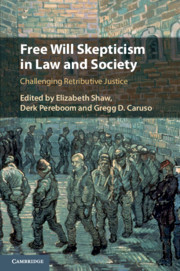Description
Free Will Skepticism in Law and Society
Challenging Retributive Justice
Coordinators: Shaw Elizabeth, Pereboom Derk, Caruso Gregg D.
Brings together leading philosophers and legal scholars to explore the practical implications of free will skepticism for law and society.
Language: English
Subject for Free Will Skepticism in Law and Society:
Free Will Skepticism in Law and Society
Publication date: 10-2021
Support: Print on demand
Publication date: 10-2021
Support: Print on demand
Free Will Skepticism in Law and Society
Publication date: 08-2019
246 p. · 15.7x23.5 cm · Hardback
Publication date: 08-2019
246 p. · 15.7x23.5 cm · Hardback
Description
/li>Contents
/li>Biography
/li>
'Free will skepticism' refers to a family of views that all take seriously the possibility that human beings lack the control in action - i.e. the free will - required for an agent to be truly deserving of blame and praise, punishment and reward. Critics fear that adopting this view would have harmful consequences for our interpersonal relationships, society, morality, meaning, and laws. Optimistic free will skeptics, on the other hand, respond by arguing that life without free will and so-called basic desert moral responsibility would not be harmful in these ways, and might even be beneficial. This collection addresses the practical implications of free will skepticism for law and society. It contains eleven original essays that provide alternatives to retributive punishment, explore what (if any) changes are needed for the criminal justice system, and ask whether we should be optimistic or pessimistic about the real-world implications of free will skepticism.
1. Free will skepticism in law and society: an overview Gregg D. Caruso, Elizabeth Shaw and Derk Pereboom; Part I. On the Practical Implications of Free Will Skepticism: Optimism vs. Pessimism: 2. Free will denial and deontological constraints Saul Smilansky; 3. Free will skepticism and its implications: the case for optimism Gregg D. Caruso; 4. Beyond the retributive system Bruce N. Waller; Part II. Alternatives to Retributive Punishment: 5. Free will skepticism and prevention of crime Derk Pereboom; 6. Deontology and deterrence for free will deniers Benjamin Vilhauer; 7. Free will skepticism, general deterrence, and the 'use' objection Kevin J. Murtagh; Part III. Free Will Skepticism and the Criminal Justice System: 8. Fichte and psychopathy: criminal justice turned upside down Michael Louis Corrado; 9. Causality and responsibility in mentally disordered offenders John Callender; 10. The implications of free will skepticism for establishing criminal liability Elizabeth Shaw; 11. Free will skepticism and criminal punishment: a preliminary ethical analysis Farah Focquaert.
Elizabeth Shaw is a lecturer in criminal law and criminology at the University of Aberdeen, where she is also a co-director of the Justice Without Retribution Network.
Derk Pereboom is Susan Linn Sage Professor in the Sage School of Philosophy and Senior Associate Dean of the Arts and Humanities at Cornell University. He is the author of Living Without Free Will (Cambridge, 2001), Consciousness and the Prospects of Physicalism (2011), and Free Will, Agency, and Meaning in Life (2014).
Gregg D. Caruso is Professor of Philosophy at Corning Community College, State University of New York and Honorary Professor of Philosophy at Macquarie University. He is also a co-director of the Justice Without Retribution Network at the University of Aberdeen School of Law. His books include Free Will and Consciousness (2012) and Exploring the Illusion of Free Will and Moral Responsibility (2013).
Derk Pereboom is Susan Linn Sage Professor in the Sage School of Philosophy and Senior Associate Dean of the Arts and Humanities at Cornell University. He is the author of Living Without Free Will (Cambridge, 2001), Consciousness and the Prospects of Physicalism (2011), and Free Will, Agency, and Meaning in Life (2014).
Gregg D. Caruso is Professor of Philosophy at Corning Community College, State University of New York and Honorary Professor of Philosophy at Macquarie University. He is also a co-director of the Justice Without Retribution Network at the University of Aberdeen School of Law. His books include Free Will and Consciousness (2012) and Exploring the Illusion of Free Will and Moral Responsibility (2013).
© 2024 LAVOISIER S.A.S.
These books may interest you

Just DesertsDebating Free Will 61.61 €



